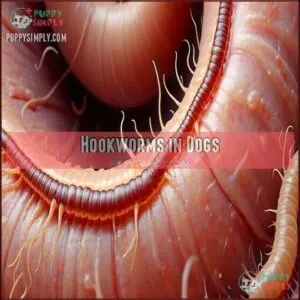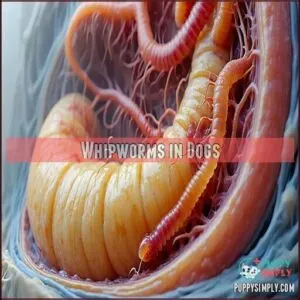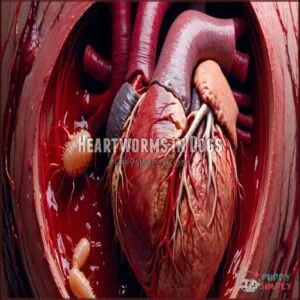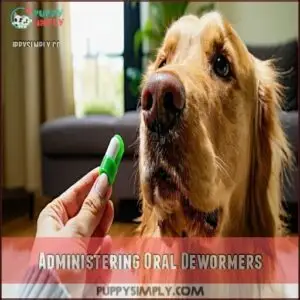This site is supported by our readers. We may earn a commission, at no cost to you, if you purchase through links.
 To deworm a dog, start by identifying the type of worms—your vet can help with this through a stool sample.
To deworm a dog, start by identifying the type of worms—your vet can help with this through a stool sample.
Choose a dewormer that’s safe and effective for their age, weight, and condition. Oral medications, like tablets or flavored chews, are easy to give, while topical treatments work for some types of worms.
Administer the dewormer as directed, and don’t skip doses! Watch for side effects like vomiting or diarrhea.
Keep your dog on a regular deworming schedule, especially if they’re outdoors often. Good hygiene and flea prevention also help prevent reinfection.
Curious about signs of worms? Stay tuned for more!
Table Of Contents
- Key Takeaways
- Types of Worms in Dogs
- How to Deworm a Dog Effectively
- Deworming Schedules for Dogs
- Preventing Future Worm Infections
- Protecting Yourself and Your Family From Worms
- Frequently Asked Questions (FAQs)
- How do I deworm my dog at home?
- Can I deworm my dog without a vet?
- What are the signs of worms in dogs?
- Can I worm my dog myself?
- What are the signs of worms in a dog?
- Should a dog follow a deworming schedule?
- How to use Dewormer for Cats and Dogs?
- When should a dog be wormed?
- How much does it cost to deworm a dog?
- Can you deworm a dog yourself?
- Conclusion
Key Takeaways
- Consult your vet to identify the type of worms and get the right dewormer based on your dog’s age, weight, and condition.
- Stick to a proper deworming schedule: puppies need treatment every 2 weeks early on, while adults should be dewormed every 3-6 months.
- Practice prevention with regular fecal tests, flea control, and good hygiene like cleaning up waste promptly to avoid reinfections.
- Watch for symptoms like bloating, diarrhea, visible worms in stool, or scooting, and act fast for effective treatment.
Types of Worms in Dogs
Dogs can host many types of worms, including roundworms, hookworms, whipworms, tapeworms, and heartworms, each with unique risks to their health.
Protect your furry friend—roundworms, hookworms, and heartworms pose serious risks, but prevention keeps tails wagging and health thriving!
Knowing what to watch for helps you protect your furry friend from serious complications.
Roundworms in Dogs
Roundworms are one of the most common types of worms in dogs, especially puppies, with infections often caused by Toxocara Canis.
These sneaky parasites can lead to bloating, diarrhea, vomiting, and stunted growth in your furry friend.
Early dog deworming is essential to protect their health.
How to combat roundworms:
- Watch for roundworm symptoms like bloated belly or poor growth.
- Use vet-recommended deworming medication regularly.
- Keep your dog’s environment clean; it reduces re-infections and lowers human risk.
Hookworms in Dogs
Hookworms are tiny, blood-sucking parasites that hijack your dog’s intestines, causing symptoms like anemia, diarrhea, and itchy paws.
These contagious hookworms can leave your furry friend weak, lethargic, or with pale gums. If you notice these worm symptoms, act quickly.
Here’s a breakdown to help:
| Concern | Solution |
|---|---|
| Hookworm anemia | Use vet-prescribed dewormers. |
| Diarrhea and weight loss | Schedule a fecal test. |
| Drug resistance in worms | Stick to vet-recommended plans. |
| Contaminated environments | Clean areas regularly. |
Routine dog deworming and heartworm preventatives are your best defenses. Combine this with good hygiene, like cleaning up poop promptly and washing paws, to keep hookworms at bay. They’re often contracted through contaminated soil ingestion.
Whipworms in Dogs
Whipworms, one of the pesky types of worms, settle stubbornly in your dog’s large intestine.
These parasites can trigger weight loss, diarrhea, and even severe anemia.
Detecting them isn’t easy—false negatives in Whipworm Diagnosis are common, complicating treatment plans.
Here’s how to manage whipworms:
- Use a vet-prescribed dog dewormer (resisting over-the-counter options).
- Prioritize Environmental Control by cleaning up dog waste immediately.
- Prevent future infestations with consistent hygiene and vet visits.
Left untreated, whipworms’ Long-Term Effects can seriously harm your pup.
Stay proactive and consider the potential for severe anemia to ensure your dog’s health.
Tapeworms in Dogs
Tapeworms are a sneaky type of worm that latch on after your dog ingests fleas carrying larvae.
Here’s how to tackle them:
- Spot Symptoms: Look for rice segments in stool, scooting, or weight loss.
- Use Medication: Administer a Praziquantel dog dewormer for effective treatment.
- Control Fleas: Break the tapeworm transmission cycle.
- Clean Environment: Wash bedding and vacuum thoroughly.
- Schedule a Fecal Exam: Confirm no missed infestations.
Stay proactive—prevention beats treatment!
Heartworms in Dogs
Heartworms, carried through mosquito transmission, are silent invaders that target your dog’s heart and lungs.
Heartworms are mosquito-borne parasites that silently invade your dog’s heart and lungs, making prevention a vital, lifesaving measure.
Early signs like mild coughing often go unnoticed, but as the disease progresses into advanced stages, symptoms include fatigue, labored breathing, and a weak pulse.
Prevention methods like monthly heartworm medication and regular heartworm diagnosis are essential.
Without them, treatment becomes expensive and risky, but prevention is truly lifesaving and saves your dog from costly treatment costs and medication side-effects while keeping the fear of these dangerous parasites at bay.
Signs of Worms in Dogs
Noticing signs of dog worms early can spare your pup from bigger health issues. If your dog’s belly resembles an inflated balloon (potbelly symptoms) or you see a sudden drop in their weight, you might be dealing with worms.
Diarrhea signs, vomiting, or even visible worms (think spaghetti or rice-like bits) in stool are key indicators. Tired pup? Low energy and anemia indicators could mean a worm infestation is draining their energy.
Scooting across the floor isn’t just a quirky habit—it’s often a response to irritation caused by worms.
- Weight Loss or bloating.
- Diarrhea Signs or bloody stool.
- Long or segmented Visible Worms in dog waste.
Quick vet corrections save stress!
How to Deworm a Dog Effectively
To effectively deworm your dog, you’ll need the right medication and proper dosing based on their age, size, and type of worms.
Following your vet’s advice guarantees your pet stays healthy while avoiding unnecessary risks, and this is a critical step in ensuring their well-being.
Choosing The Right Dewormer for Your Dog
Selecting the right dog dewormer guarantees your pet stays healthy and worm-free. Start by knowing the types of worms affecting your dog, like roundworms or tapeworms.
Always consult your vet, as prescription dewormers are customized for specific infections, unlike over-the-counter dewormers, which suit mild cases. Puppies need gentle, age-appropriate options, while broad-spectrum treatments work well for adults.
Knowing the correct deworming frequency is vital for puppies between 1-3 months, as they often require deworming every 15 days. Watch for medication interactions, especially in dogs on other treatments.
Natural alternatives, like pumpkin seeds, can complement vet-approved deworming medication but don’t replace it. Selecting the right medication protects your dog’s well-being.
| Factor | Recommendation |
|---|---|
| Worm Type | Prescription targeting specific worms |
| Dog’s Age | Puppies: gentle formulas |
| Active Ingredients | Match worm type and severity |
| Med Interactions | Get vet advice before mixing meds |
| Natural Options | Use as supplements, not substitutes |
Administering Oral Dewormers
Giving your dog a dewormer medication doesn’t have to be tricky. For smooth pill administration, hide the tablet in a treat, or use a pill pocket.
If using liquid dosage or powder mixing, blend it well with food to mask the taste, improving palatability concerns.
For easier administration, consider using palatable pill concealers.
Always supervise to guarantee safe swallowing. Watch for signs like vomiting after any prescription dewormer or over-the-counter dewormer.
Store products securely, following instructions closely. Administering deworming medication on time guarantees your dog stays happy, healthy, and worm-free.
Using Topical Dewormers
Topical treatments make deworming dogs simple and effective. They’re easy to apply and work quickly due to their high absorption rates.
Follow these steps for the best results:
- Part the fur to expose bare skin, usually between your dog’s shoulders.
- Apply the product evenly according to the dosage instructions provided.
- Keep your dog dry for 48 hours to guarantee proper absorption.
Broad-spectrum topicals target various types of worms. Carefully monitor skin reactions after application, and consult your vet for a safe, effective dog dewormer.
Monitoring Side Effects and Follow-up Care
After deworming, keep a close eye on your dog for post-treatment symptoms. While mild diarrhea or appetite changes are common, severe or prolonged issues mean it’s time for veterinary advice.
Follow-up care matters for long-term health—adjust medication if needed, and use repeat testing like fecal tests to confirm success. Many dewormers contain ingredients like pyrantel pamoate to target specific parasites.
| Symptom | Normal Reaction | When to Call the Vet |
|---|---|---|
| Lethargy | Temporary | Lasts over 48 hours |
| Diarrhea | Mild/brief | Severe or bloody |
| Appetite Loss | Short-term | Persists several days |
Preventative measures maintain pet health effectively.
Deworming Schedules for Dogs
Keeping your dog on the right deworming schedule is essential to protecting their health and preventing parasites.
Whether you’ve got a playful puppy or an adventurous adult dog, you’ll need to tailor the timing and frequency based on their age, lifestyle, and risk factors.
Puppies and Deworming Schedules
Start deworming your puppy at just 2 weeks old to protect against early parasites. Puppies face a higher risk, so sticking to a frequent deworming schedule is key.
Continue treatments every two weeks until weaning, then switch to monthly doses for long-term prevention. Always consult your vet for safe, effective deworming medication suited to your pup’s needs.
- Begin early: Start deworming at 2 weeks.
- Bi-weekly treatments: Until weaning.
- Monthly dosing: After weaning.
- Vet guidance: Always follow professional advice.
Adult Dogs and Deworming Schedules
When managing a deworming schedule for adult dogs, lifestyle factors and exposure risks are key.
Indoor-only dogs typically need preventative deworming every six months due to lower exposure, while outdoor dogs face regional parasites and require treatments every 3-4 months.
Multi-pet households should use dog dewormer every three months to avoid cross-contamination.
Regular vet checkups and fecal exams help monitor for issues like deworming resistance.
Always rotate medications when advised, ensuring your dog stays protected against parasites year-round with the right deworming frequency.
Preventing worm infestations is vital for your dog’s health.
Frequency of Deworming for Dogs
The perfect deworming schedule balances your dog’s lifestyle, exposure risks, and preventative care needs.
Puppies need frequent deworming—every 2–4 weeks early on—shifting to monthly. Adults, however, typically require it every 3–6 months.
Watch for regional variations and seasonal deworming adjustments. Over-deworming risks resistance, so consult your vet.
- Tailor plans based on habits.
- Check regional parasite threats.
- Account for age differences.
- Senior dogs need special attention.
- Monitor lifestyle factors.
The key to effective deworming is to consult your vet and understand the specific needs of your dog based on its age, health, and lifestyle.
Adjusting Deworming Schedules
Adjusting your dog’s deworming schedule keeps them healthy and free from parasites as life changes.
Whether your pup frequents busy dog parks or you’ve recently moved, exposures may vary. Puppies, in particular, need extra attention as their immune systems develop.
Here’s how to handle it:
- Review Lifestyle Factors: Does your dog roam outside more or socialize with new pets?
- Seasonal Adjustments: Warmer months may mean higher parasite risks.
- Monitor Immune Status: Illnesses or medications might affect their ability to fight worms.
- Talk to Your Vet: Diagnostic tests can make sure your dog dewormer works effectively for their health needs.
Small tweaks can mean big health benefits!
Factors Affecting Deworming Frequency
When planning your dog’s deworming schedule, several factors influence how often you’ll need to treat them. Age and lifestyle play a huge role—puppies, for example, are more vulnerable to worms and need frequent deworming every 2–4 weeks until they’re 16 weeks old.
Adult dogs, however, require a customized plan based on their exposure risk. Outdoor explorers or dogs in parasite-prone regions (like warm, humid climates) may need monthly care, while indoor pups might’ve less frequent requirements.
Your dog’s overall health matters too. Dogs with weakened immune systems, or certain breeds like Greyhounds, may be more susceptible to parasites. Medication interactions are something to watch out for—always check with your vet if your dog is on other treatments.
Geographic location also impacts deworming frequency, especially in heartworm-heavy areas. Tailor your approach to prevent worms, keeping your furry companion parasite-free.
Preventing Future Worm Infections
Keeping your dog healthy and worm-free requires a proactive approach with regular checkups, flea control, and preventative medications.
By practicing good hygiene and maintaining a clean environment, you’ll reduce the risk of reinfection and keep your pup protected.
Regular Veterinary Checkups for Dogs
If you want your dog to live its best life, regular veterinary checkups are non-negotiable.
These visits help with early detection of worms and other health issues, ensuring your pet gets preventative care suited to their needs.
Typically, a vet will:
- Perform fecal tests and parasite screening to catch infections early.
- Adjust vaccination schedules and recommend effective treatments.
- Provide informed veterinary advice for dogs’ overall health.
By staying on top of veterinary care, you’re not just protecting your pup—you’re giving them the tools to thrive, chase tails, and wag happily every day.
Flea Control and Prevention for Dogs
Fleas aren’t just pests—they’re troublemakers that keep your dog scratching and can lead to a flea infestation, tapeworms, or even Flea Allergy Dermatitis.
Stopping fleas means breaking the Flea Life Cycle and keeping your furry friend comfortable.
Start with hygiene and regular dog grooming. A flea comb used daily can uncover fleas quickly, letting you act before things get worse.
For parasite prevention, try vet-approved Topical Flea Treatments or Oral Flea Meds. These guarantee flea and tick prevention is easy and effective. A flea comb purchase can be a great investment for pet owners.
Don’t forget Environmental Flea Control. Vacuum carpets, wash your dog’s bedding, and disinfect common areas. Flea eggs and larvae hide where you least expect, so staying consistent is key.
Make flea prevention part of your dog’s routine. It’s much easier to prevent an itchy problem than deal with a full-blown flea frenzy!
Heartworm Prevention Medication for Dogs
Heartworm prevention protects your pup and saves you costly treatment down the road.
Stick to these steps:
- Schedule yearly heartworm tests to guarantee your dog stays protected.
- Pick reliable medication types like chewables or topicals with your vet’s advice.
- Use proper administration methods and weight-based dosing—no skipping doses.
- Follow preventative schedules year-round because mosquitoes don’t take breaks.
- Understand possible side effects and do a cost analysis to plan accordingly.
Heartworm prevention medication for dogs is non-negotiable—your dog’s health depends on it.
Regular deworming is vital because mosquitoes transmit heartworms.
Good Hygiene Practices for Dog Owners
Keeping your pet parasite-free starts with great hygiene. Start by washing your hands after handling your dog, picking up waste, or touching their bedding—this limits infection risks for you and your family.
Daily feces disposal is non-negotiable; clean your yard to guarantee parasites don’t linger. Regular environmental cleaning—like washing bowls, toys, and bedding weekly—helps maintain a safe pet environment cleanliness.
Practice safe food handling by keeping raw meats out of your dog’s diet unless prescribed by a vet. Teach kids proper pet hygiene practices too, like avoiding your dog’s face or eating near them.
Prevention is always simpler than treatment!
Protecting Yourself and Your Family From Worms
Keeping your family safe from worms starts with good hygiene and preventive care for your dog.
By staying proactive and following veterinary advice, you can reduce the risk of these parasites spreading to your household.
Can Humans Get Worms From Dogs
Parasites in dogs, like roundworms and hookworms, aren’t just a pet problem—they’re zoonotic parasites, meaning they can spread to humans, causing zoonotic diseases.
Kids are especially vulnerable due to outdoor play, where worm transmission often happens through contaminated soil or dog feces.
- Transmission Routes: Touching infected soil or dog poop.
- Human Symptoms: Digestive issues, organ damage, or itchy skin.
- Prevention Tips: Deworm your dog regularly and clean up waste promptly.
- Child Safety: Teach handwashing after outdoor activities and pet interactions.
Early detection in dogs safeguards your family.
Preventing Human Infection From Dog Worms
Dogs bring joy, but they can also bring zoonotic parasites. Human transmission risks are real, but simple steps can protect your family.
Hygiene best practices, like handwashing after pet contact, go a long way. Kids playing outside? Protect them with these tips:
- Wash hands after handling dogs, touching soil, or cleaning up waste.
- Dispose of waste quickly, avoiding environmental contamination.
- Wear shoes and gloves when gardening or playing outdoors to prevent zoonotic diseases.
Staying worm-free starts with clean habits and consistent awareness!
Regular fecal exams are essential for early detection.
Veterinary Guidance on Prevention and Treatment
Your veterinarian is a treasure trove of solutions for worms, offering prescription dewormers, tailored schedules, and insight on medication interactions.
Through regular vet consultations, they’ll detect worms early using advanced veterinary practices like fecal exams.
For severe infestations, trust their veterinary guidance to guarantee effective treatment.
Stick to their veterinary recommendations for preventive care, including heartworm medication, to protect your dog and family.
Don’t skip follow-up consultations—they’re vital for keeping your pet healthy and your home worm-free.
Frequently Asked Questions (FAQs)
How do I deworm my dog at home?
To deworm at home, give vet-approved medication based on your dog’s weight.
Administer pills, liquids, or topicals as directed.
Always follow up with a vet for advice, especially with puppies or severe infestations.
Can I deworm my dog without a vet?
You can deworm your dog at home using over-the-counter deworming medications designed for dogs.
Follow dosing instructions carefully, but consult a vet first to confirm it’s safe and effective for your dog’s specific needs.
What are the signs of worms in dogs?
Look for symptoms like weight loss, bloated belly, vomiting, diarrhea, itching around the rear, or visible worms in stool.
Fatigue and bloody stool can also indicate worms.
Catching it early means quicker treatment!
Can I worm my dog myself?
You can safely worm your dog at home using vet-recommended dewormers.
Just follow dosing instructions, consider their weight, and consult the vet if unsure.
However, for severe cases or puppies, a vet’s guidance is essential.
What are the signs of worms in a dog?
Spotting worms in your dog can feel like finding spaghetti in unexpected places.
Watch for signs like diarrhea, vomiting, weight loss, a bloated belly, itchy rear, or visible worms resembling rice or threads in feces, which can be a clear indicator of the presence of worms.
Should a dog follow a deworming schedule?
Yes, dogs need a deworming schedule.
It keeps parasites under control, preventing health issues like anemia or weight loss.
Puppies, adults, and outdoor dogs have different needs, so work with your vet for a customized plan.
How to use Dewormer for Cats and Dogs?
Measure the dewormer carefully, following the weight-based dosage on the label or vet’s advice.
Give it orally or topically as directed, ensuring your pet swallows it fully.
Repeat doses if required for complete effectiveness, following the instructions to ensure the treatment is effective.
When should a dog be wormed?
Worm your dog every 3-6 months, depending on their exposure to parasites, like outdoor play or eating raw meat.
Puppies need deworming every 2 weeks until 12 weeks old, then monthly until 6 months.
How much does it cost to deworm a dog?
Think of deworming as your dog’s shield against unseen foes.
Costs vary—$5–$60 depending on size and medication, while a vet consultation might add $40–$
Prevention’s priceless compared to steep treatment for severe cases, as it serves as a priceless measure to protect your dog.
Can you deworm a dog yourself?
You can deworm your dog at home using vet-recommended medications.
Choose the right product based on the parasite type, weight, and age, following dosing instructions carefully.
When unsure, consult your veterinarian for guidance.
Conclusion
Deworming a dog is like keeping a clean house—it’s essential for their health and happiness.
By identifying the type of worms, choosing the right dewormer, and sticking to a proper schedule, you’ll tackle the problem effectively.
Don’t forget regular vet checkups, flea prevention, and good hygiene to avoid reinfections.
Remember, your efforts protect your dog as well as your family, and by following these steps on how to deworm a dog, you’ll keep everyone safe and healthy.
- https://parasitesandvectors.biomedcentral.com/articles/10.1186/s13071-019-3701-7
- https://todaysveterinarypractice.com/hookworms-in-dogs/
- https://www.ncbi.nlm.nih.gov/pmc/articles/PMC6902405/
- https://www.cdc.gov/parasites/resources/web/roundworms_hookworms.html
- https://www.merckvetmanual.com/digestive-system/gastrointestinal-parasites-of-small-animals/tapeworms-in-dogs-and-cats?redirectid=74?ruleredirectid=30&qt=tapeworms&alt=sh



















